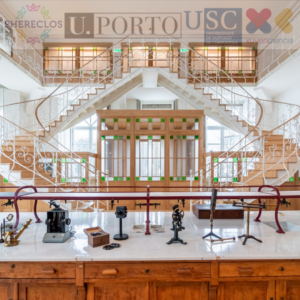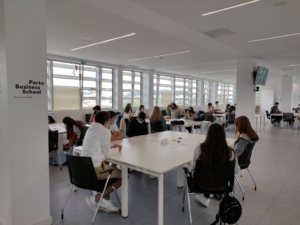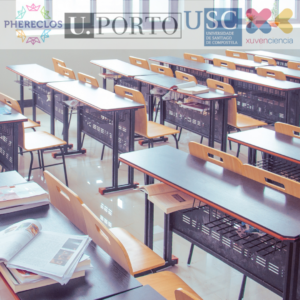
The Lugo Campus of the USC and the University of Porto promote an exchange of secondary school students
The Lugo Campus of the USC and the University of Porto promote an exchange of secondary school students from Galicia and Portugal in September. The initiative is an outcome of the European project Phereclos, in which XuvenCiencia and the Faculty of Business Administration and Management of Lugo participate. The students will be holding talks with managers of Portuguese technological companies.
A group of 35 BAC students from Ollos Grandes and Lucus Augusti high schools in Lugo and Xelmírez II in Santiago are about to travel to Porto on the 2nd and 3rd of September, where they will participate in training workshops included in the European project Phereclos under the supervision of XuvenCiencia and the Faculty of Business Administration and Management of the Lugo Campus of the USC and the University of Porto.

(Copyright by XuvenCiencia)
The students of the Galician high schools will attend a workshop articulated by Tiago Silva, from Porto Business School, and Roberto Bande, dean of the Faculty of Business Administration and Management of the Campus of Lugo of the USC. The purpose of this activity is to continue with the activity in technological entrepreneurship that the three groups of students already carried out during the last academic year within the framework of the Phereclos project. Thus, the teenagers will begin to design business ideas based on the XuvenCiencia scientific experimentation kits.
The Galician group will spend the night in a residence of the University of Porto and on Thursday, September 3rd, they will attend lectures and talks with start-up managers from Portugal’s second largest city at Fundação da Juventude (Phereclos project’s partner). In the afternoon, the students will visit the Museum of Natural History and Science of the University of Porto and the Ferreira da Silva Laboratory, which treasures 300 years of history of chemical research.
The second part of the exchange will take place on 23rd and 24th September, when a group of students from Profival, a Vocational Training School in the municipality of Valongo, in the metropolitan area of Porto, will travel to Lugo to participate in a face-to-face workshop that will take place at the Faculty of Business Administration and Management of the USC, accompanied by students from the three Galician high schools that participate in this Phereclos project.

(Copyright by XuvenCiencia)
A long collaboration
This exchange is coordinated by the heads of the teaching innovation group XuvenCiencia, Mercedes Novo Rodríguez and Wajih Al-Soufi; the dean of the Faculty of Business Administration and Management of the Lugo Campus of the USC, Roberto Bande Ramudo, and Vítor Silva, from the rectorate of the University of Porto. This Galician-Portuguese initiative of technological entrepreneurship was born thanks to their teamwork and the participation of the Galician institutes Ollos Grandes, Lucus Augusti and Xelmírez II and the Portuguese institute of Valongo, the Porto Business School and the Escola-ON association.
The transnational consortium in which XuvenCiencia and the Faculty of Business Administration and Management of Lugo take part is led by the University of Porto, through its Junior University, which participates in the PHERECLOS project of the European Horizon2020 call. The PHERECLOS project (Partnerships for Pathways to Higher Education and Science Engagement in Regional Clusters of Open Schooling) is composed of universities for children and young people from Austria, Poland, Denmark, Italy, Portugal, Finland, Romania, United Kingdom and Colombia.

(Copyright by XuvenCiencia)
XuvenCiencia and the Junior University of Porto have a long-standing collaboration that stems from the membership of both institutions in Eucu.net, the network of European universities for children and young people, and in the successful camps for pre-university students organised by both the teaching innovation group of the Lugo Campus of the USC and its Portuguese counterpart.
